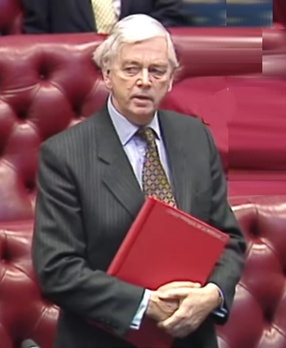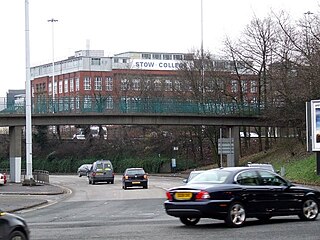
English tort law concerns the compensation for harm to people's rights to health and safety, a clean environment, property, their economic interests, or their reputations. A "tort" is a wrong in civil law, rather than criminal law, that usually requires a payment of money to make up for damage that is caused. Alongside contracts and unjust enrichment, tort law is usually seen as forming one of the three main pillars of the law of obligations.

Rylands v Fletcher (1868) LR 3 HL 330 is a leading decision by the House of Lords which established a new area of English tort law. It established the rule that one's non-natural use of their land, which leads to another's land being damaged as a result of dangerous things emanating from the land, is strictly liable.

Donald James Nicholls, Baron Nicholls of Birkenhead, was a British barrister who became a Law Lord.
Volenti non fit iniuria is a Roman legal maxim and common law doctrine which states that if someone willingly places themselves in a position where harm might result, knowing that some degree of harm might result, they are not able to bring a claim against the other party in tort or delict. Volenti applies only to the risk which a reasonable person would consider them as having assumed by their actions; thus a boxer consents to being hit, and to the injuries that might be expected from being hit, but does not consent to his opponent striking him with an iron bar, or punching him outside the usual terms of boxing. Volenti is also known as a "voluntary assumption of risk".
In English law, remoteness between a cause of action and the loss or damage sustained as a result is addressed through a set of rules in both tort and contract, which limit the amount of compensatory damages available for a wrong.

Kay v Lambeth London Borough Council; Price and others and others v Leeds City Council [2006] were two, conjoined appeals in the final court of appeal relevant for English property law, UK human rights and English tort law (trespass). It involved claims for possession by two landlords against former short-term occupiers, heavily placing reliance in their defence on article 8 of the European Convention on Human Rights, with circumstances outside the other laws.

Hughes v Lord Advocate[1963] UKHL 31 is an important Scottish delict case decided by the House of Lords on causation. The case is also influential in negligence in the English law of tort.
Roles v Nathan [1963] 1 WLR 1117, [1963] 2 All ER 908 is an occupiers' liability case in English tort law. It concerns s.2(3)(b) of the Occupiers' Liability Act 1957, which states,
"An occupier may expect that a person, in the exercise of his calling, will appreciate and guard against special risks ordinarily incident to it, so far as the occupier leaves him free to do so."

Barker v Corus (UK) plc [2006] UKHL 20 is a notable House of Lords decision in the area of industrial liability in English tort law, which deals with the area of causation. In this case, the House of Lords reconsidered its ruling in the earlier landmark case Fairchild v Glenhaven Funeral Services Ltd concerning the liability of multiple tortfeasors.

The Occupiers' Liability Act 1957 is an act of the Parliament of the United Kingdom that covers occupiers' liability. The result of the Third Report of the Law Reform Committee, the act was introduced to Parliament as the Occupiers' Liability Bill and granted royal assent on 6 June 1957, coming into force on 1 January 1958.
Occupiers' liability is a field of tort law, codified in statute, which concerns the duty of care owed by those who occupy real property, through ownership or lease, to people who visit or trespass. It deals with liability that may arise from accidents caused by the defective or dangerous condition of the premises. In English law, occupiers' liability towards visitors is regulated in the Occupiers' Liability Act 1957. In addition, occupiers' liability to trespassers is provided under the Occupiers' Liability Act 1984. Although the law largely codified the earlier common law, the difference between a "visitor" and a "trespasser", and the definition of an "occupier" continue to rely on cases for their meaning.

The Occupiers' Liability Act 1984 is an Act of the Parliament of the United Kingdom that covers occupiers' liability for trespassers. In British Railways Board v Herrington 1972 AC 877, the House of Lords had decided that occupiers owed a duty to trespassers, but the exact application of the decision was unclear. The matter was then referred to the Law Commission for a report, and as a result the Occupiers' Liability Bill was introduced to Parliament by Lord Hailsham on 23 June 1983. The act was given royal assent on 13 March 1984 as the Occupiers' Liability Act 1984 and came into force on 13 May.
Wheat v E Lacon & Co Ltd [1966] 1 All ER 582 is a decision of the House of Lords concerning the definition of "occupier" for the purposes of Occupiers' Liability Act 1957. The leading speech in the case was delivered by Lord Denning MR.

Titchener v British Railway Board [1983] 1 WLR 1427 is a Scottish delict case concerning occupiers' liability, decided by the House of Lords.

Donoghue v Folkestone Properties Limited [2003] EWCA Civ 231, QB 1008, 2 WLR 1138, 3 All ER 1101 is an English court case heard in the Court of Appeal of England and Wales concerning the tort of occupiers' liability from the Occupiers' Liability Act 1984.
Vicarious liability in English law is a doctrine of English tort law that imposes strict liability on employers for the wrongdoings of their employees. Generally, an employer will be held liable for any tort committed while an employee is conducting their duties. This liability has expanded in recent years following the decision in Lister v Hesley Hall Ltd to better cover intentional torts, such as sexual assault and deceit. Historically, it was held that most intentional wrongdoings were not in the course of ordinary employment, but recent case law suggests that where an action is closely connected with an employee's duties, an employer can be found vicariously liable. The leading case is now the Supreme Court decision in Catholic Child Welfare Society v Institute of the Brothers of the Christian Schools, which emphasised the concept of "enterprise risk".

The Defective Premises Act 1972 is an act of the Parliament of the United Kingdom that covers landlords' and builders' liability for poorly constructed and poorly maintained buildings, along with any injuries that may result. During the 19th century, the common law principle that a landlord could not be liable for letting a poorly maintained house was established, while a long-running principle was that, in practice, builders could not be sued for constructing defective buildings. The courts began to turn against the first principle during the 20th century, imposing several restrictions on the landlord's immunity, but the landlord was still largely free from being sued.

Attorney-General v De Keyser's Royal Hotel Limited is a leading case in UK constitutional law decided by the House of Lords in 1920 which exhaustively considered the principles on which the courts decide whether statute has fettered prerogative power. It decided that the royal prerogative does not entitle the Crown to take possession of a subject's land or buildings for administrative purposes connected with the defence of the realm without paying compensation. It is the authority for the statement that the royal prerogative is placed in abeyance when statute law can provide a legal basis for an action.

Woolfson v Strathclyde Regional Council [1978] UKHL 5 is a UK company law case concerning piercing the corporate veil.

Weir-Rodgers v SF Trust Ltd [2005] IESC 2 is a reported decision of the Irish Supreme Court that confirmed that under Section 4 of the Occupiers Liability Act 1995 an occupier of land is not required to take all reasonable care to safeguard the person or property of either trespassers or recreational users.








